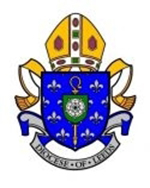History and Geography
Geography at St Joseph’s Catholic Primary School
Intent, Implementation and Impact of our Geography Curriculum
Geography Subject Leader- Catherine Naylor
Intent
Geography at St Joseph’s aims to inspire; giving pupils a curiosity and fascination about the world and its people that will remain with them forever. We aim to equip pupils with knowledge about diverse places, people, resources and natural and human environments, together with an understanding of the Earth’s key physical and human processes. Alongside this knowledge and understanding, children will develop geographical skills; collecting and analysing data and using globes, maps, photos and digital mapping tools. Critical thinking will be encouraged when considering local and global geographical issues. Children will know and use subject specific vocabulary and will communicate their knowledge in a variety of ways. Practical research and enquiry are key aspects of Geography teaching and every child will take part in fieldwork every year.
Implementation
At St Joseph’s we use National Curriculum objectives as the starting point for our Geography planning and then use Lancashire’s ‘Key Learning in Geography’ documents to create the curriculum planning document for our school- ensuring coverage of knowledge and progression in skills across our 5 classes. We map Geography topics across 2 years to account for our mixed-age classes. We use units of work from ‘Plan Bee’ to assist with planning and enhance delivery for many of our Geography topics. In addition, we take into account the local circumstances of our school and the knowledge and interests of staff when choosing localities to study.
Each class undertakes fieldwork during the summer term. A separate document, ‘Progression in Mapping’ produced by the Geographical Association, is used when planning our fieldwork. Class teachers work with the subject leader when planning fieldwork to ensure quality provision and progression of skills throughout the school.
Impact
We expect that, by the end of Year 6, our pupils will have the skills and knowledge they will need to access the KS3 Geography curriculum. They will have sense of curiosity about the world and a mental ‘bucket-list’ of places in the world they would like to find out more about or visit in the future. Our pupils will have an awareness of and an interest in the world around them and be able to think critically about real life local and global issues.
| Name | |
|---|---|
| Geography Long Term Plans 2023-24 & 2022-23.pdf | Download |
Geography Progression
| Name | |
|---|---|
| Geography Progression 2023.pdf | Download |
History at St Joseph’s Catholic Primary School
Intent, implementation and impact of our History Curriculum
History Subject Leader- Nicola Dixon
At Saint Joseph's Catholic Primary School, we shape our History curriculum to ensure it is fully inclusive to every child. Through this we aim to equip all of our children with the knowledge and skills to ‘think like a Historian’.
Our aims are to fulfill the requirements of the National Curriculum for History by providing a broad, balanced and differentiated curriculum that:
- Ensures the progressive development of Historical concepts, knowledge and skills
- Allows children to study life in the past in an exciting, engaging way
- Encompasses British Values throughout
Intent
Our teaching equips pupils with knowledge about the History of Britain and how it has influenced and been influenced by the wider world. Our children learn about significant aspects of the History of the wider world like Ancient Civilisations and Empires whilst also explaining changes in living memory and beyond living memory. They learn about the lives of significant people of the past and understand the methods of Historical enquiry; whilst also asking and answering key questions about the past. We want children to enjoy and love learning about History by gaining this knowledge and skills, not just through experiences in the classroom, but also drawing upon the knowledge of visitors into school and going out on educational visits.
Implementation
In ensuring high standards of teaching and learning in History, we implement a curriculum that is progressive throughout the whole school. History is taught as part of a half-termly topic, focusing on knowledge and skills stated in the National Curriculum. We ensure that History has the same importance given to it as the core subjects as we feel this is important in enabling all children to gain ‘real-life’ experiences. In addition to this, key writing opportunities are explored to ensure that writing across the curriculum reflects work produced within English books. Learning takes place through discussion, debate and opinion to stretch understanding and challenge different views of the past. The scheme of learning is bespoke to our setting with local history impacting upon our History curriculum.
Topics are carefully planned across year groups to ensure that we provide children with a wide range of exciting learning opportunities that are closely linked to the National Curriculum for History.
Impact
We will ensure that our children are equipped with historical skills and knowledge that will enable them to be ready for the curriculum at Key Stage 3 and for life as an adult in the wider world. We want our children to have thoroughly enjoyed learning about History, therefore encouraging them to undertake new life experiences now and in the future.
| Name | |
|---|---|
| History Long Term Plan.pdf | Download |
Progression Map
| Name | |
|---|---|
| History Progression May 2023.pdf | Download |
























